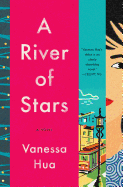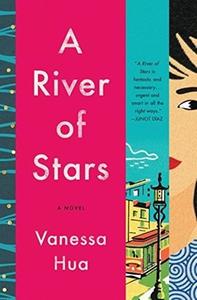
 Early in Vanessa Hua's moving debut, she describes how "long ago, two lovers--a humble cow herder and a weaver girl, a fairy in disguise--were torn apart when the Goddess of Heaven, the fairy's mother, scratched her hairpin onto the night sky, welling up a river of stars to separate them." In the following pages, two pregnant Chinese women arrive in the United States and go on the run after being betrayed and exiled by their lovers.
Early in Vanessa Hua's moving debut, she describes how "long ago, two lovers--a humble cow herder and a weaver girl, a fairy in disguise--were torn apart when the Goddess of Heaven, the fairy's mother, scratched her hairpin onto the night sky, welling up a river of stars to separate them." In the following pages, two pregnant Chinese women arrive in the United States and go on the run after being betrayed and exiled by their lovers.Scarlett Chen is a 30-something woman sent by Boss Yeung, her well-heeled and married lover, to give birth to their son at Perfume Bay--a posh "birthing hotel" in a Los Angeles suburb--and therefore gain automatic U.S. citizenship for the child. Boss Yeung intends to pay her off and raise the child with his wife, but Scarlett discovers via an ultrasound examination that she will have a daughter. Fearing anger and reprisal, she escapes in a stolen van with teenaged stowaway Daisy, a fellow Perfume Bay resident. They drive north to San Francisco's Chinatown, where they give birth.
Much of A River of Stars then revolves around Scarlett and Daisy's attempt to fly under the radar in Chinatown's slums, surviving in poverty and evading detectives paid by Uncle Lo, Boss Yeung's wealthy friend and Perfume Bay investor, to find Scarlett.
Hua delves into Scarlett's feelings of abandonment and her growing resentment as primary caregiver to Daisy and the babies. The story moves from the uncertain freneticism of despair and escape into a quiet domesticity punctuated by money woes and fear of deportation. As Scarlett struggles to balance motherhood, family and personal ambitions, she must decide whether to risk revealing herself as she chases citizenship or remain hidden from her lover and pursuer.
Hua, a San Francisco Chronicle columnist, has written extensively about the Asian diaspora. She approaches her story with journalistic purpose and warm humor, shedding light on Chinese birth tourism, the process by which pregnant women visit the United States on tourist visas to give birth to babies who instantly become citizens. Hua also addresses the difficulties Chinese women face in finding opportunities for advancement in a stratified economy and the lengths to which these women--factory girls earning meager wages, wealthy wives worried over future prospects--go to in their quest for citizenship.
The heroines in A River of Stars are strong, resourceful and eager to embrace the values of their adopted countries to overcome desperate circumstances. In highlighting the struggles immigrants face in their home countries, Hua gives a very real face to a population often marginalized by political theorizing and racial clichés. They are not outsiders, but the very embodiment of the American dream. --Nancy Powell, freelance writer and technical consultant
Shelf Talker: A River of Stars is a revelatory novel that highlights the struggles of immigrant mothers in their quest to achieve citizenship and the American dream.
Shelf Talker: A River of Stars is a revelatory novel that highlights the struggles of immigrant mothers in their quest to achieve citizenship and the American dream.

